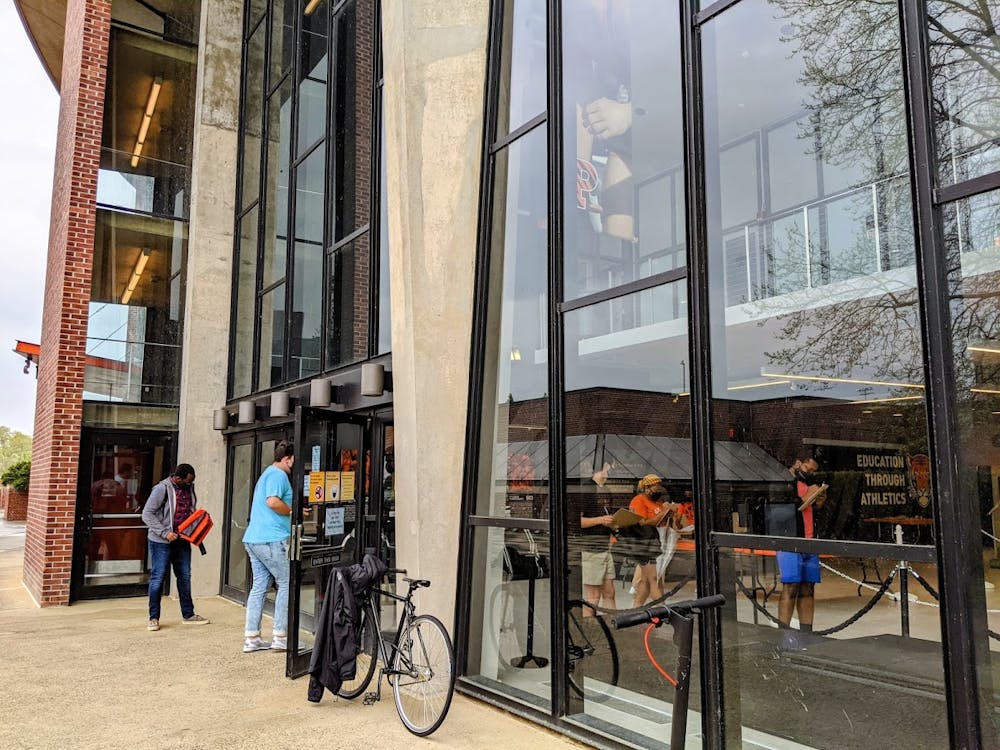In a total of 21 vaccine clinics held between April 29 and July 7, the University administered 7,930 doses of the Pfizer-BioNTech and Johnson & Johnson (J&J) vaccines.
Recipients of the vaccine included faculty, students, and staff at the University, as well as residents of the town of Princeton and other municipalities. Many were children and teenagers, with 44 percent of the Pfizer doses given to children ages 12–15.
Eighteen clinics administered 7,587 doses of the Pfizer vaccine, and three clinics administered 343 doses of the J&J vaccine. The University did not disclose how many individuals were vaccinated in total — but the number likely exceeds 4,136 people, since those eligible to be vaccinated can receive no more than one J&J shot and no more than two Pfizer doses.
Most clinics were held over the summer, though the first clinics were announced on April 27, as students finished their spring semester and prepared for the start of reading period. They were open to undergraduate students, graduate students, and on-campus staff. These first clinics prioritized international students, given that many would be returning home to countries where access to an FDA-approved vaccine was uncertain.
The three J&J clinics were operated in association with the Princeton Public Health Department. The most frequented clinic took place on April 29, with 223 doses administered, while 90 shots and 30 shots were given at the May 6 and May 15 clinics, respectively.
By May, the University received its first shipments of Pfizer doses from the New Jersey Department of Health, and began to accept appointments from the public through the New Jersey Vaccine Scheduling System (NJVSS).

Beginning in early May, total doses of the Pfizer vaccine administered at the clinics increased steadily over time, with a median of 448 doses per clinic. A majority were first doses until early June, when second doses began to outnumber first doses.
On May 12, 2021, the Pfizer vaccine was approved by the Centers for Disease Control and Prevention (CDC) for children ages 12–15. The first University-run clinic at which this age group was eligible took place on May 14, and 395 adolescents got a shot that day, representing over 70 percent of the clinic’s doses.
Of the over 7,000 Pfizer doses administered at the University, just over 13 percent went to members of the immediate University community: undergraduates, graduate students, faculty, and staff. All University community members are required to be vaccinated for the 2021–22 Academic Year, though a small number may be exempt for religious or medical reasons.

Among University community members, faculty and staff accounted for nearly half the demand for shots — they received 487 total shots, compared to 317 for undergraduates and 184 for graduate students.
Overall, faculty and staff were more likely to be receiving a first dose at the clinics, while undergraduates and graduate students were more likely to receive a second dose. This suggests that many students had already received their first dose elsewhere.
According to a report from University Health Services (UHS), “Several teams contributed to the planning and coordination of the clinics,” with tasks that included ordering supplies, handling storage and dispensation, setting up appointments through NJVSS, and supporting the day-to-day clinic operations (including “crowd control”).
The report also stated that the clinics’ medical staff included “14 registered nurses, 2 physicians, [and] 1 pharmacist in addition to 7 volunteers who offered over 200 hours of service.”
Across the country, an important metric for many months has been percent of doses used — essentially, how many doses were administered, and how many were wasted because they didn’t make it into someone’s arm.
Vaccine efficiency was made a priority at the clinics, according to Deputy University Spokesperson Michael Hotchkiss.
“We planned the clinics and managed our vaccine supply to ensure that no one who was eligible for vaccination was turned away and that we minimized any wasted doses,” he wrote. “In general, any wasted doses at each clinic were limited to fewer than the six doses in a single vaccine vial.”
Hotchkiss did not elaborate further on how many doses were used or wasted, respectively, at Princeton’s clinics.
University-hosted Pfizer vaccine clinics are still ongoing, with the University website specifying that clinics took place on August 11 and August 18, and will continue on August 25 and into September. Walk-ins are accepted.
The September clinics are available for booking using the NJVSS, and are planned to take place every Wednesday from 1 p.m. to 4 p.m., from September 1 to September 29.








